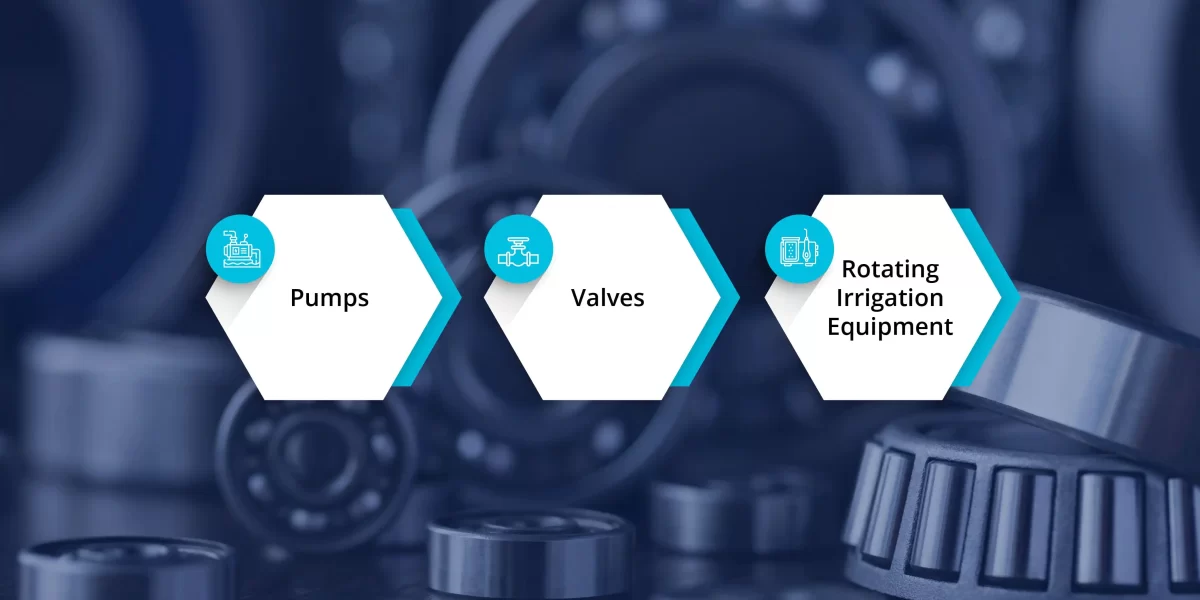In the agricultural sector, the seamless operation of farming machinery is crucial for maximising productivity and efficiency. Bearings play a pivotal role in various agricultural applications, ranging from powering harvesting equipment to facilitating water management systems and post-harvest handling.
Machinery Mobility and Maneuverability
Agricultural machinery, such as tractors and implements, rely on bearings for mobility and manoeuvrability across diverse terrains. Bearings are integral components of wheel assemblies, allowing for smooth rotation and efficient power transmission from the engine to the wheels. Additionally, bearings support the steering mechanisms of tractors, ensuring precise control and manoeuvrability during field operations. By providing low friction and reliable performance, bearings enable farmers to navigate their equipment with ease, enhancing overall efficiency in fieldwork. Some specific applications of bearings in agricultural machinery can be summarised as:
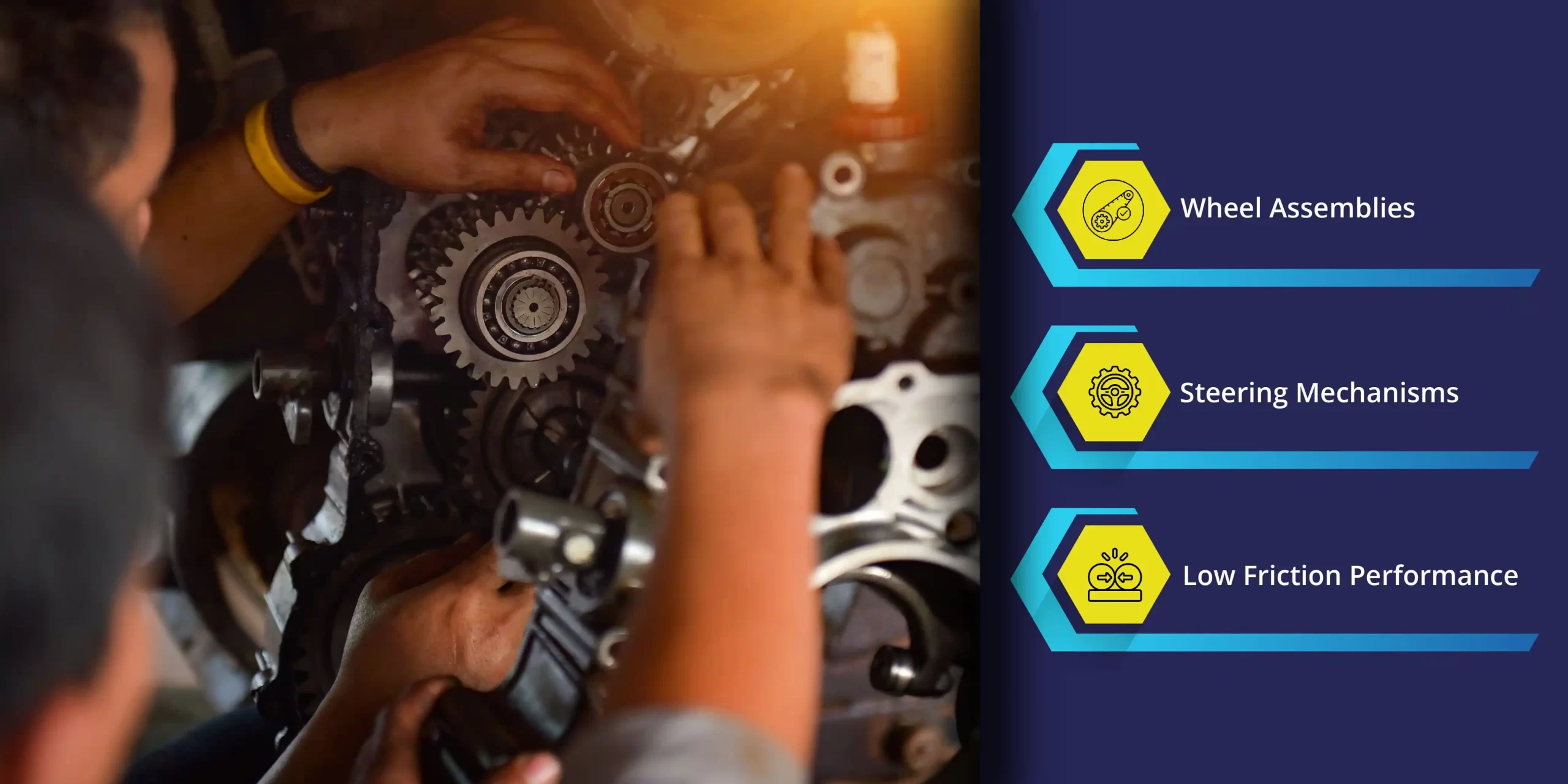
Wheel Assemblies
These enable smooth rotation and efficient power transmission from the engine to the wheels, while supporting the rotating shafts within the wheel hubs, thereby allowing the wheels to turn freely and move across various terrains with minimal resistance. Whether it’s traversing rough terrain or navigating through fields, bearings ensure the mobility and manoeuvrability of agricultural equipment, enhancing overall productivity.
Steering Mechanisms
Bearings are employed in tractors at specific points such as steering columns, linkages, and joints, facilitating smooth movement and precise control of the steering system. This enables farmers to manoeuvre their equipment with ease, whether it’s turning corners in the field or navigating narrow pathways. By providing reliable steering control, bearings enhance the safety and efficiency of agricultural operations, allowing farmers to optimise their fieldwork practices.
Low Friction Performance
Bearings in agricultural machinery are designed to minimise friction and wear, ensuring smooth operation and prolonged lifespan of the equipment. Low friction bearings like Ceramic bearings reduce energy consumption and enhance fuel efficiency, making them ideal for agricultural applications where maximising productivity while minimising operating costs is paramount. Additionally, low friction bearings contribute to reduced maintenance requirements, as they experience less wear and tear over time, resulting in decreased downtime and higher uptime for agricultural machinery.
Bearings used in agricultural machinery are engineered to withstand the demanding conditions encountered in field operations. They are designed to endure heavy loads, shocks, and vibrations associated with traversing uneven terrain and performing various tasks in the field. By providing reliable performance under harsh environmental conditions, bearings ensure the durability and longevity of agricultural equipment, allowing farmers to rely on their machinery for uninterrupted operation throughout the farming season.
Powering Harvesting and Processing Equipment
In the agricultural sector, bearings are essential for powering a wide range of harvesting and processing equipment. They facilitate smooth rotation and movement, enabling efficient harvesting and processing of crops with minimal downtime. Additionally, bearings withstand heavy loads and dynamic forces encountered during operation, ensuring reliable performance even in demanding conditions.
Some of the main applications in agriculture include combine harvesters, threshers, and milling machines. Bearings are utilised in various components of these machines, such as the rotor assemblies, augers, and conveyor systems.
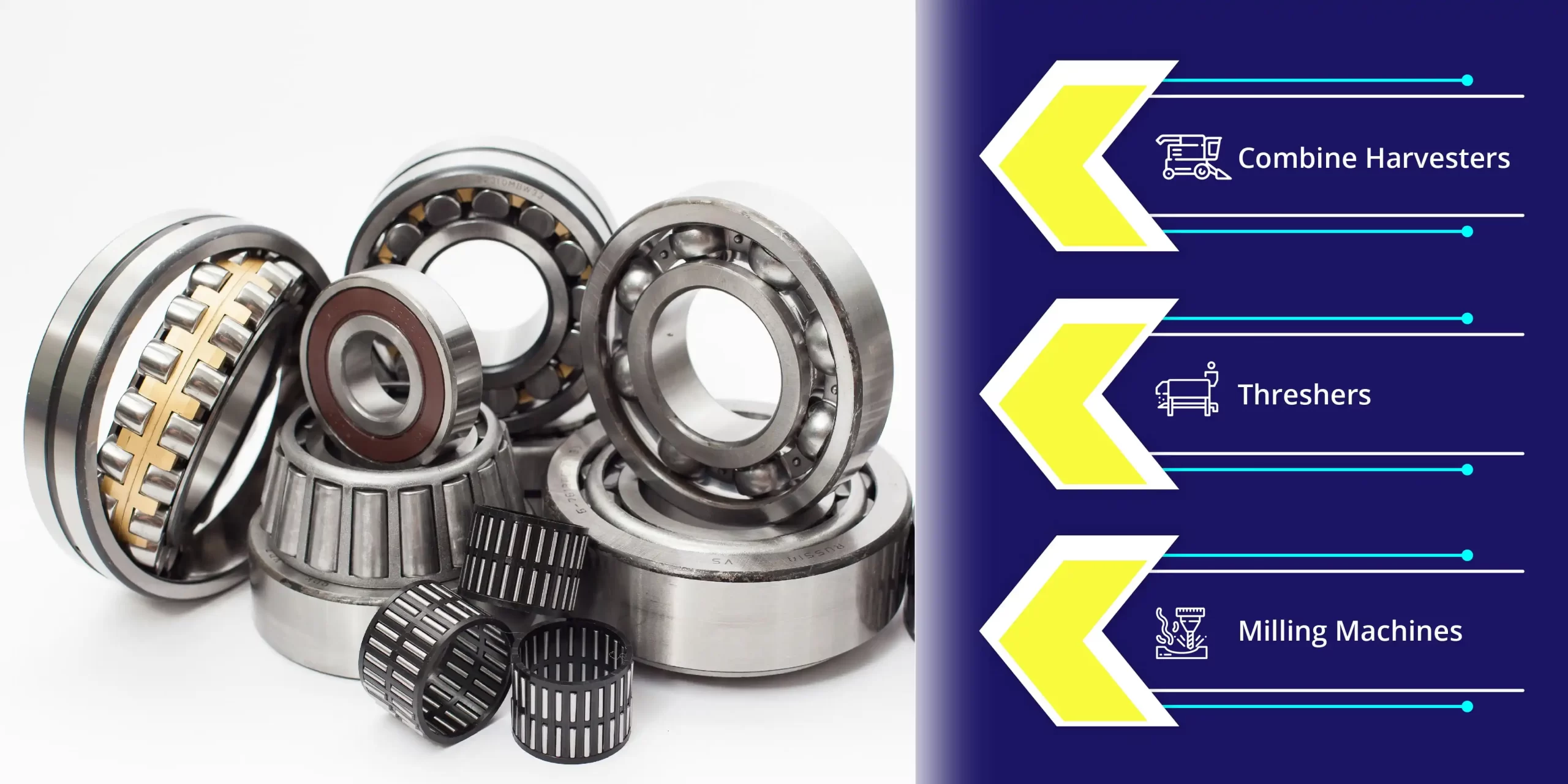
Combine Harvesters
Bearings are integral components of combine harvesters, which are used for harvesting a variety of crops such as wheat, rice, and corn. Within the rotor assemblies of combine harvesters, bearings support the rotating shafts and mechanisms responsible for cutting, threshing, and separating the harvested crop from the stalks. Bearings enable smooth rotation of the rotor assemblies, allowing for efficient crop harvesting and separation processes.
Threshers
Threshers are agricultural machines designed to separate grains from harvested crop stalks. Bearings are utilized in the moving parts of threshers, including the drum assemblies and rotating blades. These bearings facilitate the smooth rotation of the threshing components, enabling effective separation of grains from the crop stalks. By withstanding the heavy loads and dynamic forces encountered during threshing operations, bearings ensure reliable performance and minimize downtime.
Milling Machines
Milling machines are used in the agricultural sector for processing harvested grains into various products such as flour, feed, and cereals. Angular contact ball bearings play a crucial role in the conveyor systems and milling mechanisms of these machines. They support the rotating shafts and rollers responsible for grinding and milling grains, facilitating the smooth movement of the milling components. Bearings withstand the high loads and rotational speeds associated with milling operations, ensuring consistent and efficient processing of harvested crops.
In addition to facilitating smooth rotation and movement, bearings in agricultural equipment must withstand heavy loads, shocks, and vibrations encountered during operation. Their ability to withstand these dynamic forces ensures reliable performance and minimizes the risk of equipment failure or downtime, thereby enhancing overall productivity in agricultural operations. By enabling efficient harvesting and processing of crops with minimal downtime, bearings contribute to the optimization of agricultural processes and the maximization of crop yields.
Water Management Systems
Water management is critical in agriculture, and bearings play a crucial role in powering essential components of irrigation and water management systems. Bearings are utilized in pumps, valves, and rotating irrigation equipment, enabling efficient water distribution and management across agricultural fields.
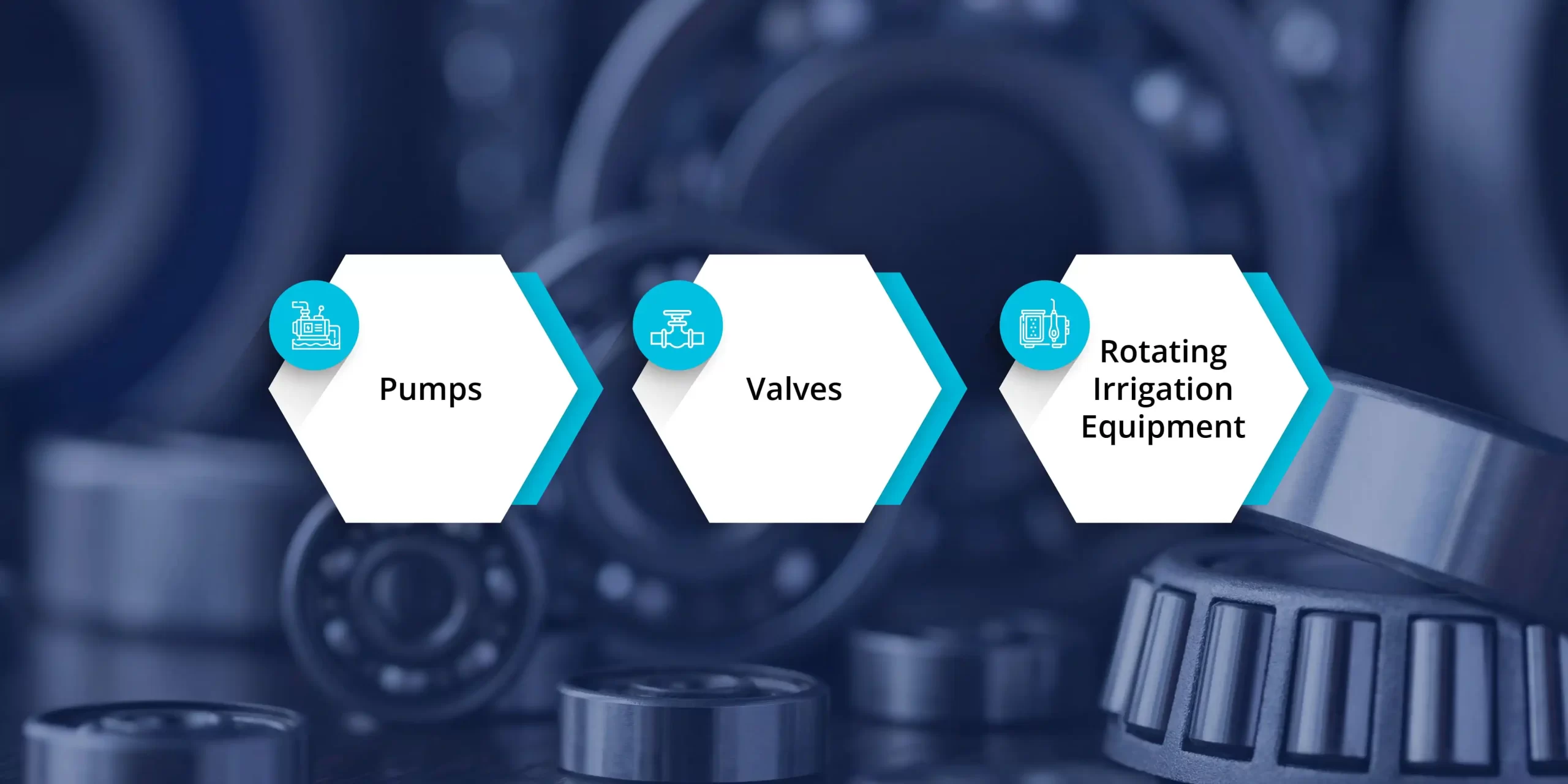
Pumps
Whether it’s submersible pumps deployed for drawing water from wells or centrifugal pumps utilised for surface water irrigation, bearings facilitate the rotational movement of pump shafts and impellers. By reducing friction and enabling smooth rotation, bearings ensure the efficient transfer of mechanical energy from the motor to the pump, thereby facilitating the lifting and transportation of water to agricultural fields.
Valves
Within irrigation systems, valves control the flow of water, directing it to specific areas of the field as per the requirements of different crops and soil conditions. Bearings are integral components of valve assemblies, supporting the moving parts such as stems, discs, and gates. These bearings enable the smooth operation of valves, allowing precise regulation of water flow rates and pressures. By ensuring reliable valve performance, bearings contribute to the accurate and efficient distribution of water, optimising irrigation practices and maximising water utilisation.
Rotating Irrigation Equipment
In modern irrigation techniques such as centre pivot and linear move systems, rotating equipment plays a crucial role in uniformly distributing water across large agricultural areas. Bearings are essential components of rotating irrigation equipment, including pivot points, towers, and wheel assemblies. These bearings enable smooth rotation and movement of the irrigation equipment, ensuring even coverage of water over the entire field. By maintaining consistent rotational motion without frictional resistance, bearings contribute to efficient water distribution, enhancing crop irrigation practices and promoting optimal crop growth.
Therefore, whether it’s pumping water from wells or distributing irrigation water through sprinkler systems, bearings ensure smooth operation and reliability, contributing to effective water conservation and crop irrigation practices.
Poultry Farming Operations
In poultry farming operations, bearings are utilised in various equipment essential for feed processing, mixing, and manure handling. Bearings are integral components of feed processing equipment, such as hammer mills and pellet mills, facilitating the grinding and pelleting of feed ingredients.
Additionally, bearings support the rotating shafts of feed mixers, ensuring thorough blending of feed components for optimal nutrition. Furthermore, bearings are employed in manure spreaders, facilitating the efficient distribution of organic fertilisers across agricultural fields.
Post-Harvest Handling and Storage
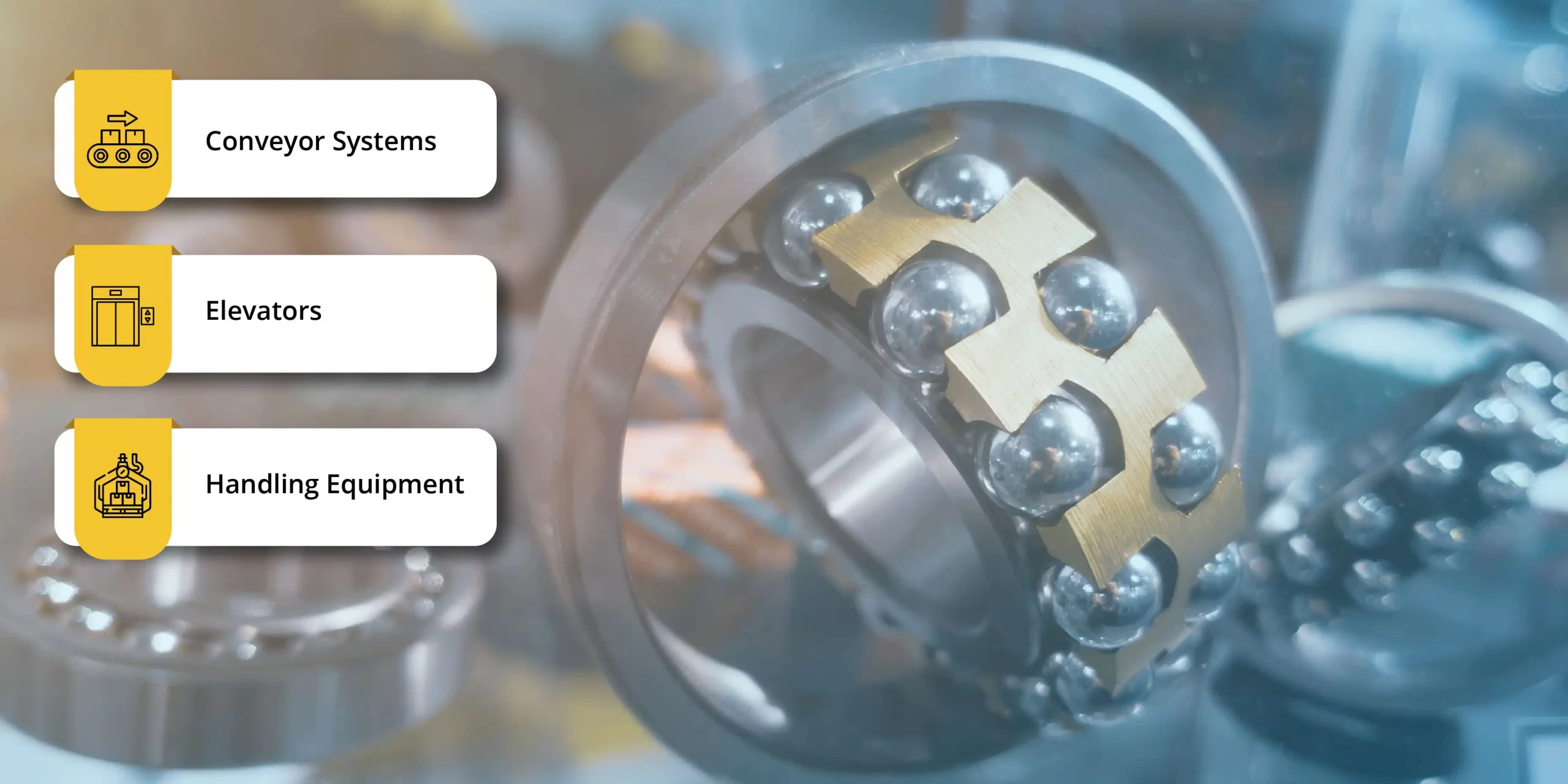
After harvesting, efficient post-harvest handling and storage are essential for preserving the quality and value of agricultural produce. Bearings play a vital role in conveyor systems, elevators, and handling equipment used in post-harvest operations. Bearings enable smooth movement and transport of harvested crops along conveyor belts and elevators, facilitating sorting, grading, and packaging processes. Bearings also support the moving parts of handling equipment, such as bucket elevators and grain augers, ensuring reliable performance during grain storage and transportation. Here’s a look at how each component of the handling and storage machines benefit from bearings.
Conveyor Systems
Bearings are integral components of conveyor systems used in post-harvest handling facilities. These bearings support the rotating shafts of conveyor rollers, enabling the smooth movement of harvested crops along the conveyor belts. By reducing friction and enabling efficient transport, bearings facilitate the sorting, grading, and packaging processes, ensuring the efficient handling of agricultural produce after harvest.
Elevators
In grain storage facilities, elevators are used to lift harvested crops to different levels for storage or processing. Deep Groove Ball Bearings play a crucial role in the operation of elevator systems, supporting the moving parts of elevator buckets or platforms. These bearings enable smooth and reliable movement, allowing harvested crops to be transported vertically with precision and efficiency. By ensuring the proper functioning of elevators, bearings contribute to the effective management of grain storage and facilitate easy access to stored crops.
Handling Equipment
Various types of handling equipment, such as bucket elevators and grain augers, are utilised in post-harvest operations for transferring harvested crops between different locations. Bearings support the rotating shafts and moving components of handling equipment, ensuring smooth operation during grain storage and transportation. Whether it’s loading harvested crops into storage bins or transferring them to processing facilities, bearings enable efficient handling and transport, minimising the risk of damage or spoilage to agricultural produce.
In conclusion, bearings play a crucial role in enhancing efficiency and productivity in the agricultural sector by enabling the smooth operation of machinery and equipment across various applications. From powering harvesting equipment to facilitating water management systems and post-harvest handling, bearings contribute to the seamless functioning of agricultural operations, ultimately supporting food production and supply chains.
FAQ's
Which bearing is used in tractors?
Tractors typically utilise a variety of bearings, including ball bearings, roller bearings, and tapered roller bearings, in various components such as wheel hubs, transmission systems, and steering mechanisms.
What is the purpose of bearings?
Bearings are mechanical components designed to reduce friction and facilitate smooth movement between stationary and moving parts in machinery and equipment. They support rotating shafts, wheels, and other moving components, enabling efficient power transmission and motion.
What type of bearings are used?
In agriculture, a wide range of bearings are used, including ball bearings, roller bearings, needle bearings, and plain bearings, depending on the specific application and load requirements of the equipment.
What is the bearing material used?
Bearings are typically made from high-quality steel alloys, such as chrome steel (52100), stainless steel, or ceramic materials, chosen for their excellent mechanical properties, durability, and resistance to wear and corrosion.


